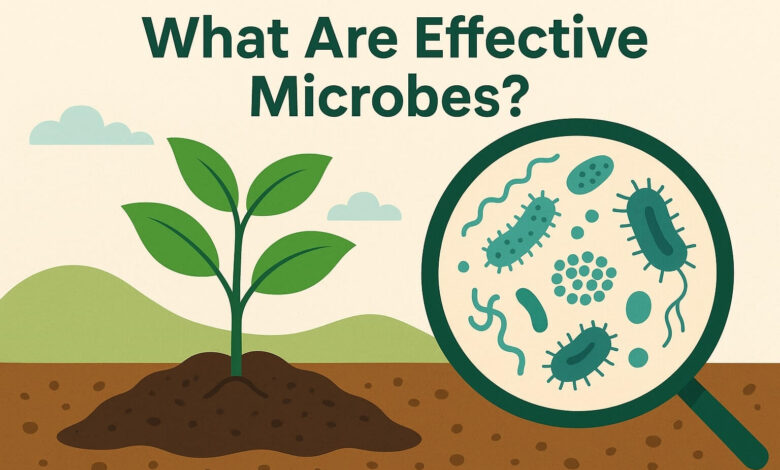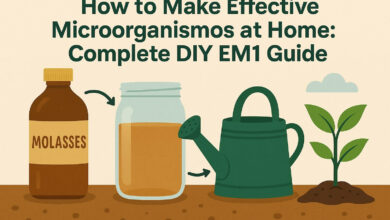What Are Effective Microbes? A Complete Guide

Effective Microbes (EM), also known as Effective Microorganisms, refer to a consortium of beneficial microbes that promote balance and regeneration in natural and artificial ecosystems. Originally developed by Professor Teruo Higa in Japan during the 1980s, EM technology has spread globally across industries like agriculture, composting, waste management, and health care. Today, understanding the role of Effective Microbes is essential for anyone interested in sustainable practices and environmental stewardship.
What Are Effective Microorganisms Made Of?
EM typically contains three core microbial groups that work in synergy:
- Lactic acid bacteria – Improve soil structure and suppress harmful microbes. These bacteria are known for their ability to ferment sugars, producing lactic acid, which lowers pH and creates an environment unfavorable for pathogens.
- Photosynthetic bacteria – Capture solar energy and recycle organic substances. These microorganisms play a vital role in photosynthesis and contribute to the nutrient cycle by converting sunlight into energy that can be used by other organisms.
- Yeasts – Aid fermentation and support beneficial microbial populations. Yeasts are essential in various fermentation processes, producing alcohol and carbon dioxide, which helps in the breakdown of organic materials.
How Do Effective Microbes Work?
Effective Microbes do not act individually; instead, they collaborate to improve the microbial balance of an environment. EM enhances the population of beneficial organisms while suppressing harmful ones. When introduced to soil, water, or even the gut, these microbes:
- Convert organic matter into nutrients more efficiently, allowing for better nutrient uptake by plants.
- Suppress pathogens through competitive exclusion, outcompeting harmful bacteria for resources.
- Facilitate fermentation instead of decay (putrefaction), transforming waste into valuable nutrients.
- Enhance enzyme and vitamin availability, promoting overall health in ecosystems.
What Are the Benefits of Using Effective Microbes?
Effective Microorganisms bring a wide range of advantages across multiple domains:
In Soil and Agriculture
- Boosts soil fertility and nutrient availability. For instance, farmers using EM have reported improved yields and healthier crops without the excessive use of chemical fertilizers.
- Increases crop yield and resistance to disease, demonstrating better overall plant health and resilience to environmental stressors.
- Reduces reliance on synthetic fertilizers and pesticides, promoting a more sustainable approach to farming that minimizes environmental impact.
In Composting
- Accelerates composting process, allowing organic waste to break down faster and more efficiently.
- Reduces foul odor during decomposition, making composting more pleasant and accessible for urban gardeners.
- Produces high-quality organic fertilizer, which can enrich soil and promote plant growth.
In Waste and Water Treatment
- Improves wastewater quality and clarity, making it safer for discharge into natural bodies of water.
- Reduces sludge and harmful gases, contributing to a cleaner environment and reduced odor issues in treatment facilities.
- Revives polluted natural water bodies, restoring ecosystems and biodiversity.
In Health and Wellness
- Used in probiotic supplements to support gut health, aiding digestion and absorption of nutrients.
- May improve digestion and immune response, contributing to overall well-being and health.
- Safe for use in livestock for better nutrition absorption, which can enhance meat and dairy production.
Frequently Asked Questions (FAQ)
Are Effective Microbes the Same as Probiotics?
While both are beneficial microbes, probiotics are typically targeted at gut health in humans and animals, whereas EM refers to a broader blend used in environmental, agricultural, and industrial settings. Some EM formulations can be used as probiotics, depending on safety and intended use. In fact, the diverse applications of EM highlight its versatility and importance in various sectors.
Can I Make Effective Microbes at Home?
Yes, many users prepare homemade EM using ingredients like molasses, rice wash water, and fermented milk. However, the results can vary, and commercial EM1 products offer standardized quality and concentration. Making EM at home can be a fun and educational project, providing insights into microbial processes.
How Do I Apply Effective Microorganisms in My Garden?
EM can be applied as a foliar spray, mixed into irrigation water, or directly incorporated into the soil. Regular application improves plant health, boosts growth, and reduces disease incidence. Many gardeners have reported that using EM leads to more vibrant plants and higher yields, especially in organic gardening practices.
Do Effective Microbes Really Work?
Numerous scientific studies and anecdotal evidence support EM’s effectiveness, particularly in sustainable agriculture, composting, and water purification. However, results may vary depending on the application, environmental conditions, and product quality. Research continues to explore the full potential of EM across various fields.
Where Can I Buy Effective Microorganisms?
EM products are available through gardening supply stores, online marketplaces like Amazon, and official distributors. Look for products labeled EM-1 or certified by EMRO (EM Research Organization). As the popularity of EM grows, more retailers are beginning to stock high-quality options for consumers.
Where Can I Find Effective Microbes for Sale?
For those seeking to purchase Effective Microbes, various avenues exist including gardening supply stores, popular online platforms like Amazon, and authorized EM distributors. It is advisable to identify products bearing the labels EM-1 or endorsed by EMRO (EM Research Organization) for quality assurance and effectiveness. Always check for customer reviews and product certifications to ensure you’re getting a reliable product.
Conclusion
Effective Microbes offer a sustainable, eco-friendly solution to modern environmental challenges. Whether you’re aiming to enrich your soil, speed up composting, purify water, or support your gut health, EM technology provides an accessible, proven method rooted in nature’s own balance. As awareness grows, more individuals and industries are embracing EM for a cleaner, healthier future. The ongoing research into Effective Microbes promises to unlock even more benefits and applications, making them an essential tool for sustainable living.
Next up: Learn how to brew your own homemade EM solution with our easy step-by-step guide!
